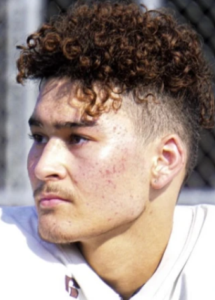by James A. Bacon
Last week 17-year-old Justice Dunham was shot to death during an altercation in the parking lot outside Menchville High School in Newport News. The incident took place after a basketball game. In the version of the story given by 18-year-old Demari Batten, who was charged with the shooting, he saw a group of four or five people with whom he had been feuding. As he tried to get into his car, the group crowded around him, and he fired a gun to get them to back off. He later told police he didn’t know at the time whom he had shot.
That’s at least the second school shooting to occur in the Hampton Roads metropolitan area this school year. These are not the kinds of school shootings we’re accustomed to hearing about — alienated loners lashing out randomly in blind vengeance, who end up committing suicide or suicide-by-cop. There is nothing to indicate that Batten was psychologically disturbed. What we’re seeing here is a sociological phenomenon: a breakdown in social order.
It’s one thing to have shootings break out in the Pure Diamonds Gentlemen’s Club in Portsmouth at 1:30 a.m. — four shot, three hospitalized, as reported this morning — after adults have been partying with alcohol and drugs. But schools are supposed to be a protected environment. Kids are supposed to be safe. It is becoming increasingly clear, however, that in some schools, the kids are not safe. Indeed, social order seems to be collapsing.
Virginia’s educational establishment is in denial. The State Board of Education made no mention of the rising tide of school violence in its 2021 Conditions and Needs of Public Schools. To do so would be to admit the massive failure of Virginia’s schools’ efforts to end the so-called schools-to-prison pipeline by substituting therapeutic “social-emotional learning” in place of traditional disciplinary measures.
William Golding’s famous novel, The Lord of the Flies, tells the story of English school boys who are cast away on a desert island and, in the absence of adult supervision, become primitive savages. That’s what I fear is happening in our schools. In the absence of effective adult supervision, kids are reverting to the rule of the street. In the past, kids who came from from single-parent households may not have been subjected to much discipline at home, but they faced consequences for misbehavior in schools. Today, kids are sitting in healing circles and being told to acknowledge how their misbehavior hurts the feelings of others. The therapy may work for some, but others regard it as a joke; the adults in schools come to be seen as ineffectual buffoons.
I know of at least one Virginia high school serving a lower-income population where fights — often multiple fights — break out almost every day. Two or more teachers have been assaulted since the beginning of the school year. Virtually every teacher at that school wants out. Students are routinely socially promoted, often into honors classes where they can’t keep up, but teachers are brow-beaten into passing them and, for purposes of calculating grade point averages, their participation in honors classes gives the school a boost. In a variant of the old Soviet adage, “They pretend to pay us, and we pretend to work,” the attitude at this school might be described: “They pretend to learn, and we pretend to teach them.” Except some students don’t even pretend to learn.
I have no personal knowledge of what’s occurring at Menchville High School. The school’s “Quality Profile” indicates that 40% of the students are economically disadvantaged, which is high but not as high as in many schools. The student body is about 40% White, 34% Black, and 15% Hispanic. This is not an “inner-city” school. Fourteen percent of the students last year were classified as chronically absent. Absenteeism was worst for Blacks and Hispanics but widespread among Whites (9.6%) and even Asians (8.7%).
The Quality Profile data is worthless for gauging the state of order/disorder in the school. Most parents would like to know how often fights occur, how often students get injured, how often teachers are assaulted, and other data along those lines. The Virginia Department of Education does not provide that information. Instead, it provides percentage breakdowns of short-term and long-term suspensions by race/ethnicity. Thus we can see that 58% of suspensions in the 2018-19 school year were Black kids. That dropped to 55% in the next school year, and only 33% in the 2020-21 school year — showing great progress in terms of achieving “equity,” defined as equal group outcomes! We don’t know how many kids were suspended, much less how many actual incidents occurred. The only thing citizens can quantify, thanks to media reports, is the number of murders.
School officials in Richmond appear to be flying blind. Their published data provides no clue as to what impact social-emotional learning policies are having in the real world. Two explanations present themselves: they do not care about real-world results… or they want to suppress them.



